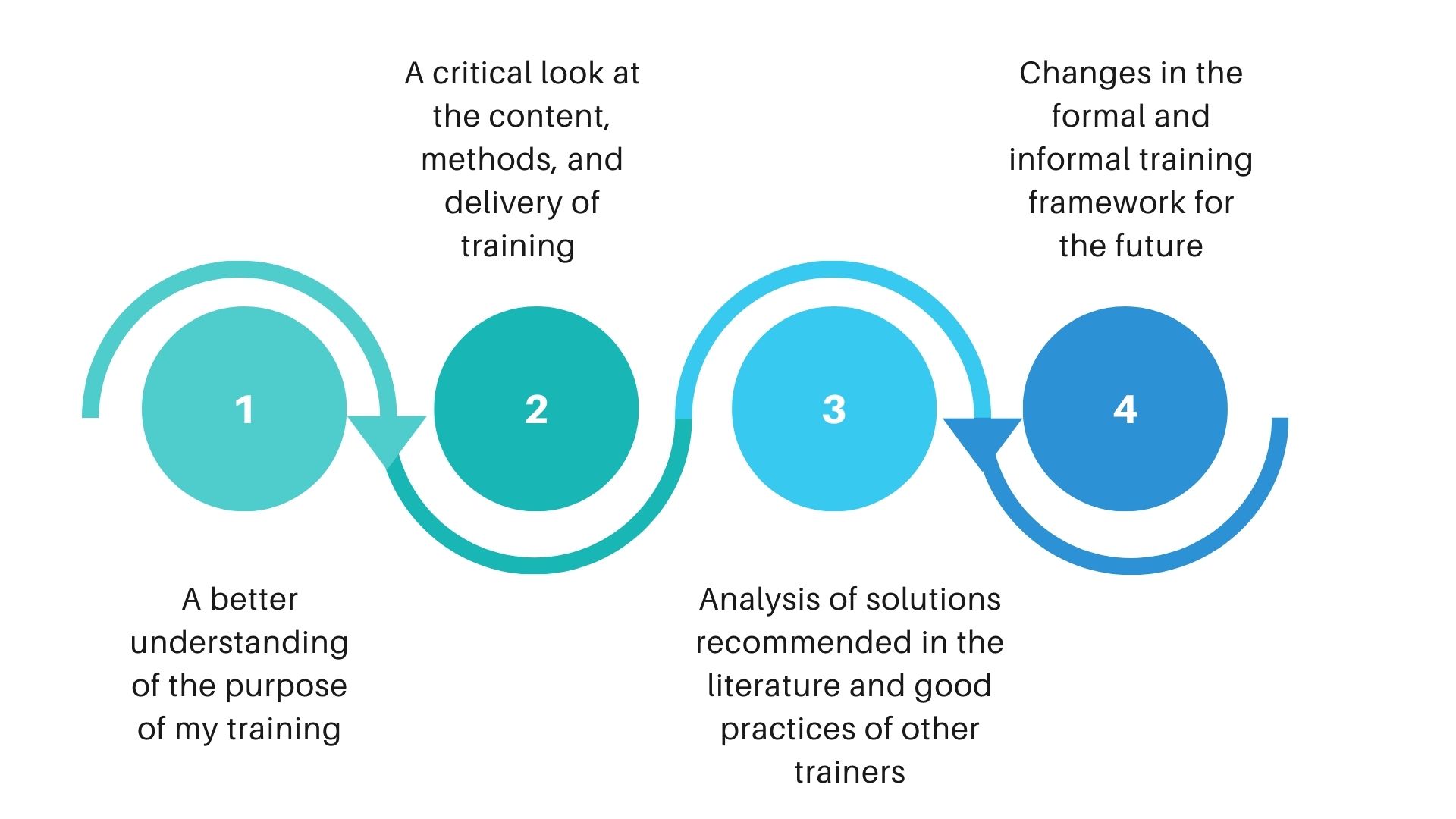As a trainer, I link my academic knowledge and trade union member perspective. I emphasize inclusivity, adaptability, and innovative methods tailored to union members’ diverse educational backgrounds and ages. This is distinct from my academic teaching, as union trainees voluntarily participate to gain practical knowledge for their activities.
While preparing the ePortfolio and thanks to the entire Eurotrainers course, I gained knowledge and skills that helped me to better understand my role as a trade union trainer. The first point was to understand better and acknowledge cultural differences, gender, and trade union cultures in adult education processes to promote multicultural competence. It is strongly connected with the well-developed training sessions that combine various methods tailored to trade union contexts, which are enormously different from the academic lectures and classes. During my ETT1 and ETT2, I understood better the emphasized pedagogical aspects, cultural awareness, and reflective techniques in my future union training. The ePortfolio preparation allowed me to consolidate better a methodological and theoretical aspect of planning and evaluation of my union training and answer three key questions: „What? How? Why?”. As a result, I’ve learned the fundamentals of using portfolios as assessment tools in education management, focusing on validation and certification. In this context, I was previously not fully aware of the importance of self-assessment, which can play a crucial role in a better and, therefore, more critical understanding of adult education processes, methodologies, and training practices for effectiveness.
Based on the theoretical aspect of creating an e-portfolio (Describe, Raise as an issue, Analyse, Theorise, Reinvest), I made my own approach for preparing my trade union’s training, including the following elements.

By answering the fundamental questions „When?, Where?, What?, How?, Why?” Bloom’s Taxonomy (Remember, Understand, Apply, Analyze, Evaluate, Create) I can better understand the purpose of my training, better place it in the current external and internal context, and better understand the purpose of the activity and the methods used. During and after the training, I can collect relevant feedback through online platforms and tools to see how far my assumptions were correct, what succeeded or failed, and what the trainees thought was missing during our training. In this process, I learned how to do self-evaluation better. An important aspect was to understand that critical comments from a non-scientific and non-academic perspective can be extremely useful. Another thing I learned while preparing the ePortfolio was to deliver future lessons based on existing union literature and the experience of other trainers. In this regard, it is worthwhile to prepare a platform in the future where Eurotrainers can tap into a database containing the latest studies in trade union education and be able to exchange good practices more often on webinars as well. The final step is to change the training both formally and informally. This includes changing the scenario, lesson plan, resource materials, pre- and post-activity questions sent via e-platforms and having less formal conversations with the training organizers and channels to get to know the trainees. During the ETT1 and EET2 training, the presenters of the activities and workshops made me realize the importance of participant observation before and after their training unit and how important it is to understand the group and contact other trainers and event organizers.
One of the more non-obvious lessons from participating in the Eurotrainers process was becoming aware of the European training practices. Trade union education occurs in EU member countries and a strongly regional and national context. Also, at least in training Polish trade unionists, I conduct training in my native language. Thanks to ETUI, I better understood the Pan-European perspective of training, trade union education, and the importance of our activity in building a labor ethos and awareness across the European Union. Europe is a continent of multiple languages, cultural codes, and memory policies. Getting to know European trade unionists throughout the process of „becoming” a Eurotrainer, I realized how different we are in our understanding of trade unions and their role and importance in our national social, economic, and political realities. On the other hand, however, I have come to understand that the strength of the European trade union movement is to measure up to the common challenges of declining unionization, the disappearance of stable industrial jobs, the aging of the membership base, and the macroeconomic and technological changes undermining the world of work in the global West. In the process of self-reflection on my coaching experience, thanks to the experience described above, I have better understood that a common European, solidarity, and union response has a greater chance of success in responding to the challenges described above.
Preparing the ePortfolio also made me better aware of my strengths and unique qualities as a trainer. Like an academic as well as a researcher, I can draw on the latest scholarly and expert studies in my classes – on countering radical populism or teaching about the role and significance of the Holocaust for contemporary society. I follow the latest publications in these fields. As a union member with contact with workers, I can skillfully translate researchers’ jargon into the language of union training and convey knowledge about complex and complicated processes in an understandable and empathetic way. Thanks to my work with students at the university, I skillfully use modern e-education tools, reaching out before and after training with source materials and those for further self-study. I can also rely on popular cultural sources that are easily accessible to union members.